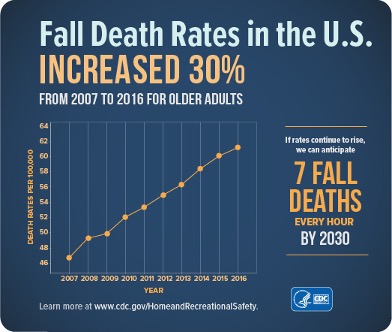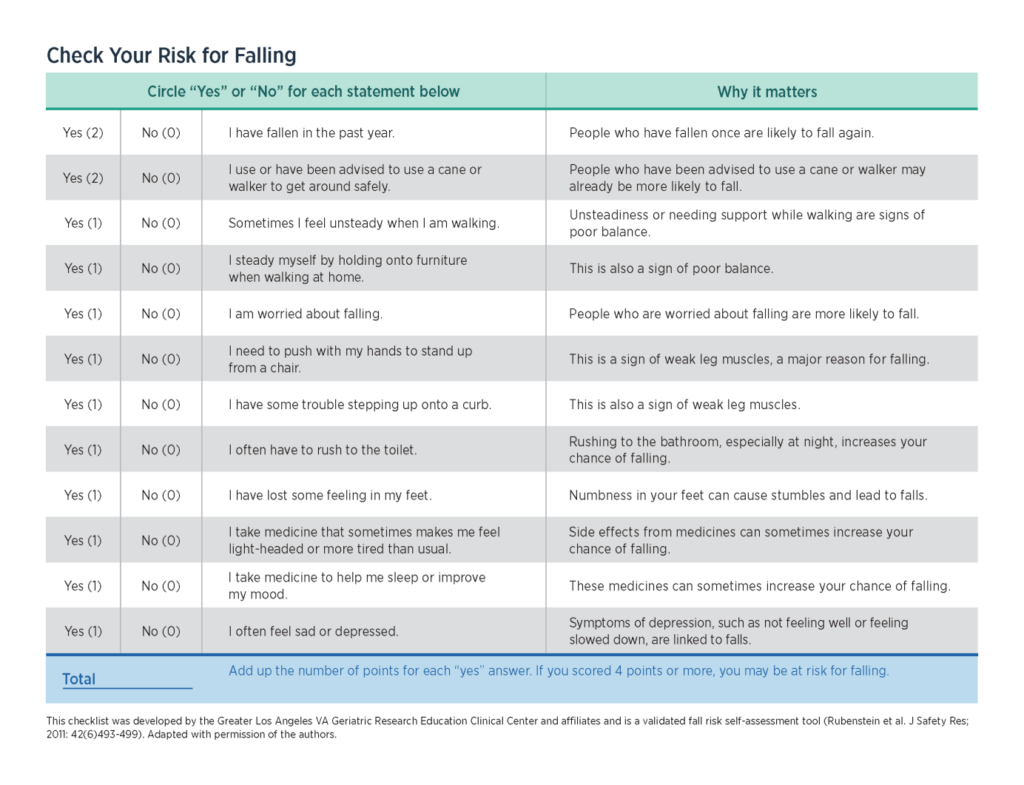
Recommended by James E. Malone, DO, family physician with Bridgeport Family Healthcare.
More than 10,000 people in the United States turn 65 every day. Each year, millions of older people—those 65 and older—fall.

“The number of falls and fall injuries will only increase, as the population of older Americans continues to grow,” said Dr. James E. Malone, DO, at Bridgeport Family Healthcare. “West Virginia has the third highest number of residents 65 and older, which accounts for 20% of the state’s population.”
In fact, more than one out of four older people fall each year, but less than half tell their doctor. Falling once doubles your chances of falling again. Death rates from falls have also increased to approximately 30% in the last decade.
- One out of five falls causes a serious injury such as broken bones or a head injury
- Each year, 3 million older people seek treatment in emergency departments for fall injuries.
- More than 800,000 patients a year are hospitalized due to a fall injury, most often a head injury or hip fracture.
- Each year at least 300,000 older people are hospitalized for hip fractures.
- More than 95% of hip fractures are caused by falling, usually by falling sideways.
- Falls are the most common cause of traumatic brain injuries (TBI).
- More than 8 million falls require medical attention or limited activity for a least one day
- 88 older adults die daily due to a fall, which is more than 32,000 people annually
“Not all falls result in an injury,” said Dr. Malone. “However, one in five falls does cause a serious injury, such as a broken bone or a head injury.”
These injuries can make it hard for a person to get around, do everyday activities, or live on their own.
- Falls can cause broken bones, like wrist, arm, ankle, and hip fractures.
- Falls can cause head injuries. These can be very serious, especially if the person is taking certain medicines (like blood thinners). An older person who falls and hits their head should see their doctor right away to make sure they do not have a brain injury.
- Many people, who fall, even if they are not injured, become afraid of falling. This fear may cause a person to cut down on their everyday activities. When a person is less active, they become weaker and this increases their chances of falling.
Research has identified many conditions that contribute to falling, commonly referred to as risk factors. Many risk factors can be changed or modified to help prevent falls. These include:
- Lower body weakness
- Vitamin D deficiency (that is, not enough vitamin D in your system)
- Difficulties with walking and balance
- Use of medicines, such as tranquilizers, sedatives, or antidepressants. Even some over-the-counter medicines can affect your balance.
- Vision problems
- Foot pain or poor footwear
- Home hazards or dangers such as
- broken or uneven steps, and
- throw rugs or clutter.
“Generally, falls occur due to one or more combination of risk factors,” said Dr. Malone. “An increase in risk factors only intensifies the likelihood of a significant fall.”
What You Can Do to Prevent Falls
To prevent falls, try some of these simple tips to keep yourself from falling.
Talk to Your Doctor
- Ask your doctor or healthcare provider to evaluate your risk for falling and talk with them about specific things you can do
- Ask your doctor or pharmacist to review your medicines to see if any might make you dizzy or sleepy. This should include prescription medicines and over-the counter medicines.
- Ask your doctor or healthcare provider about taking vitamin D supplements.
Do Strength and Balance Exercises
Do exercises that make your legs stronger and improve your balance. Tai Chi is a good example of this type of exercise.
Have Your Eyes Checked
Have your eyes checked by an eye doctor at least once a year, and be sure to update your eyeglasses if needed.
If you have bifocal or progressive lenses, you may want to get a pair of glasses with only your distance prescription for outdoor activities, such as walking. Sometimes these types of lenses can make things seem closer or farther away than they really are.
Make Your Home Safer
- Get rid of obstructions that may cause you to trip.
- Add grab bars to both inside and outside of your tub or shower and next to the toilet.
- Put railings on both sides of stairs.
- Make sure your home has lots of light by adding more or brighter light bulbs.
“Make your humble abode safe, so you can think of it as ‘home sweet home,’” said Dr. Malone.
Source: Centers for Disease Control and Prevention (CDC)

Please note, the information provided throughout this site is not intended or implied to be a substitute for professional medical advice, diagnosis, or treatment. All content, including text, graphics, images, and video, on or available through this website is for general information purposes only. If you are experiencing related symptoms, please visit your doctor or call 9-1-1 in an emergency.